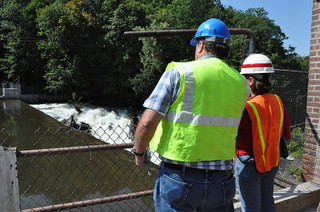 To clean up a Superfund site, remedial investigations and feasibility studies (RI/FS) provide an officially-mandated process that reflects each specific situation. Scoping is the preliminary planning step that outlines how remedial investigation and analysis will flow.
To clean up a Superfund site, remedial investigations and feasibility studies (RI/FS) provide an officially-mandated process that reflects each specific situation. Scoping is the preliminary planning step that outlines how remedial investigation and analysis will flow.
Scoping takes place before remedial investigation begins, but remains a flexible and integral part of RI/FS to ensure focus, completeness and efficiency. Representatives from lead and support agencies, consultants and responsible parties work together to determine the work to be done and most efficient sequence.
They also decide whether remediation will be most effectively conducted as a single project or several discrete “operable units” that address specific geographic areas or site issues. Time and resources are important considerations along with the science in determining final site remedy solutions.
Scoping establishes a customized site cleanup process.
The United States Environmental Protection Agency’s (EPA) overall goal for each contaminated site is “to select remedial actions that are protective of human health and the environment, that maintain protection over time, and that minimize untreated waste.”
Toward that end, scoping includes a series of activities designed to ensure an efficient, effective and cost-effective outcome. These steps include:
- Conducting site kickoff meetings that include lead and support agencies, contractors and other technical experts, enforcement staff and people knowledgeable about the particular site or similar ones.
- Evaluating existing data.
- Conducting a site visit.
- Developing a conceptual site model.
- Identify remedial action objectives (RAOs) and potential remedial alternatives
- Determining applicable or relevant and appropriate requirements (ARARs) to assist in setting project goals and analyzing remedial alternatives, particularly to identify contaminant- and location-specific requirements and determine presence of Resource Conservation and Recovery Act regulated hazardous waste. ARARs must meet both federal and New York State requirements.
- Determine initial data needs and data quality objectives.
Scoping results in preparation of several project plans which outline how the remedial investigation and feasibility study will move forward. These project plans include a:
- Work plan (WP) which describes analysis and decisions resulting from the scoping process, including specific tasks required to conduct the remedial investigation and feasibility study.
- Sampling and analysis plan (SAP) to ensure technically acceptable protocols are followed and to help estimate final project costs.
- Health and safety plan (HSP) to ensure onsite workers, the community and environment are protected against potentially hazardous operations or exposure during the cleanup process.
- Community relations plan (CRP) to ensure the public is informed about and included in remedial decision-making.
